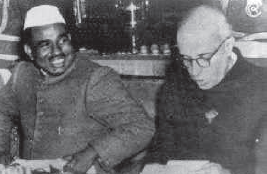Babu Jagjivan Ram
m (Pdewan moved page Babu Jagjivan Ram, Meira Kumar to Babu Jagjivan Ram without leaving a redirect) |
|||
| Line 14: | Line 14: | ||
| − | =Babu Jagjivan Ram, Meira Kumar = | + | =Babu Jagjivan Ram, [[Meira Kumar]] = |
[[File: Babu Jagjivan Ram with Pandit Nehru.png|Babu Jagjivan Ram with Pandit Nehru|frame|left|500px]] | [[File: Babu Jagjivan Ram with Pandit Nehru.png|Babu Jagjivan Ram with Pandit Nehru|frame|left|500px]] | ||
[[File: mer.png||frame|500px]] | [[File: mer.png||frame|500px]] | ||
Revision as of 17:14, 3 July 2017
This is a collection of articles archived for the excellence of their content. Readers will be able to edit existing articles and post new articles directly |
Babu Jagjivan Ram, Meira Kumar
By Meira Kumar
A many Splendoured Journey
India Harmony VOLUME - 1 : ISSUE - 6 SEPTEMBER-OCTOBER, 2012
Babu Jagjivan Ram
Babu Jagjivan Ram with his indomitable will and social reformist zeal so successfully carried forward the torch of the untouchability movement started by Gandhiji.
Babuji's childhood was not as privileged as his daughter's. Son of Sobhi Ram, a soldier in the British Army, he grew up in his native village of Chandwa, Bihar. His father died early after having quit his army job in an act of rebellion, leaving the family to a life of struggle. However, Babuji did not give up his education and in 1922 joined the english medium Arrah Town School. Unfazed by caste discrimination in his school, even being made to drink water from a pot marked “untouchables”, he doggedly continues his education. However, this incident became a turning point that lit in him the lamp of determination to fight a social evil that millions like him had learned to bear over the centuries.
Pandit Madan Mohan Malviya, on a visit to his school was so impressed by his passionate oratory that he invited him to join the Banaras Hindu University where he was awarded the Birla Scholarship. But his Dalit origins hounded him there too. He could not be served food in his hostel room as no attendant was ready to wash his dishes and no barber would give him a hair cut because he was an untouchable. In disgust, he left for Calcutta where he finally earned his B. Sc. Degree from Calcutta University. It was here that he organized conferences and rallies on the issue of discrimination and came to the notice of Subhash Chandra Bose.
His journey as a freedom fighter, social activist and political crusader had begun. The next sixty years were to see him rise from those early troubles to the post of Deputy Prime Minister of India, a national leader who was undisputedly the most charismatic, efficient and committed leader of the backward classes. He contributed to the establishment of the “All India Depressed Classes League” and dedicated himself to attaining equality for untouchables. The rest is history.
In 1985, Babuji had the satisfaction of seeing his daughter Meira Kumar take over the baton from him when she won her first election from Bijnor. It was not a cake walk. In the fray were two other young Dalit leaders, Ram Vilas Paswan and Mayawati. It was a close victory as her two rivals also scored a significant number of votes launching their careers as Dalit icons in the years to come. Much water has flown under the bridge since then.
See also
Babu Jagjivan Ram

